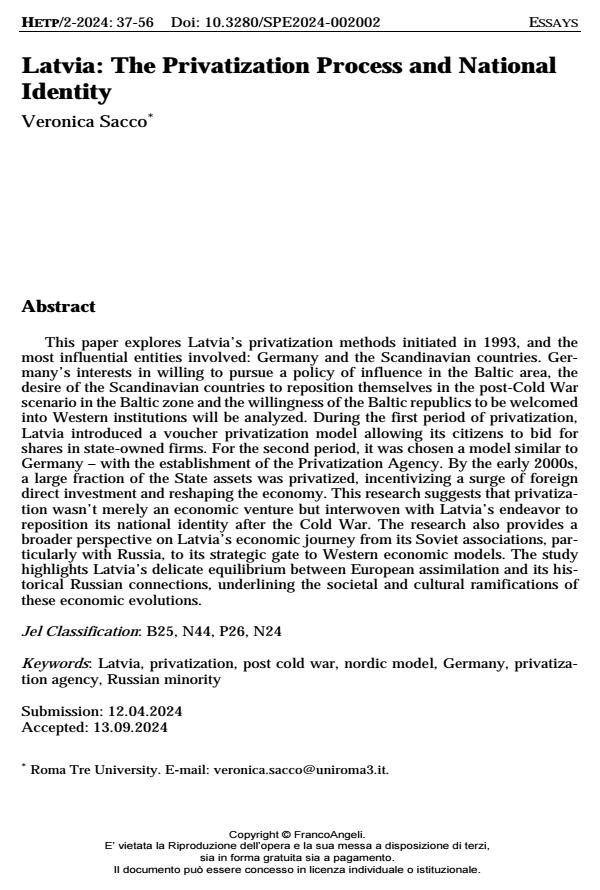Latvia: The Privatization Process and National Identity
Titolo Rivista HISTORY OF ECONOMIC THOUGHT AND POLICY
Autori/Curatori Veronica Sacco
Anno di pubblicazione 2025 Fascicolo 2024/2
Lingua Inglese Numero pagine 20 P. 37-56 Dimensione file 162 KB
DOI 10.3280/SPE2024-002002
Il DOI è il codice a barre della proprietà intellettuale: per saperne di più
clicca qui
Qui sotto puoi vedere in anteprima la prima pagina di questo articolo.
Se questo articolo ti interessa, lo puoi acquistare (e scaricare in formato pdf) seguendo le facili indicazioni per acquistare il download credit. Acquista Download Credits per scaricare questo Articolo in formato PDF

FrancoAngeli è membro della Publishers International Linking Association, Inc (PILA), associazione indipendente e non profit per facilitare (attraverso i servizi tecnologici implementati da CrossRef.org) l’accesso degli studiosi ai contenuti digitali nelle pubblicazioni professionali e scientifiche.
This paper explores Latvia’s privatization methods initiated in 1993, and the most influential entities involved: Germany and the Scandinavian countries. Germany’s interests in willing to pursue a policy of influence in the Baltic area, the desire of the Scandinavian countries to reposition themselves in the post-Cold War scenario in the Baltic zone and the willingness of the Baltic republics to be welcomed into Western institutions will be analyzed. During the first period of privatization, Latvia introduced a voucher privatization model allowing its citizens to bid for shares in state-owned firms. For the second period, it was chosen a model similar to Germany – with the establishment of the Privatization Agency. By the early 2000s, a large fraction of the State assets was privatized, incentivizing a surge of foreign direct investment and reshaping the economy. This research suggests that privatization wasn’t merely an economic venture but interwoven with Latvia’s endeavor to reposition its national identity after the Cold War. The research also provides a broader perspective on Latvia’s economic journey from its Soviet associations, particularly with Russia, to its strategic gate to Western economic models. The study highlights Latvia’s delicate equilibrium between European assimilation and its historical Russian connections, underlining the societal and cultural ramifications of these economic evolutions.
Parole chiave:Latvia, privatization, post cold war, nordic model, Germany, privatization agency, Russian minority
Jel codes:B25, N44, P26, N24
Veronica Sacco, Latvia: The Privatization Process and National Identity in "HISTORY OF ECONOMIC THOUGHT AND POLICY" 2/2024, pp 37-56, DOI: 10.3280/SPE2024-002002